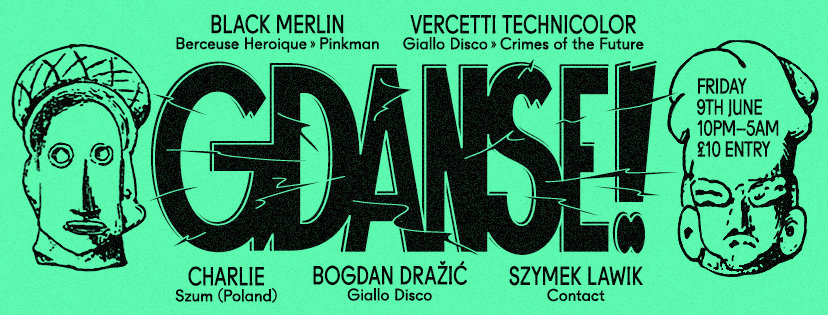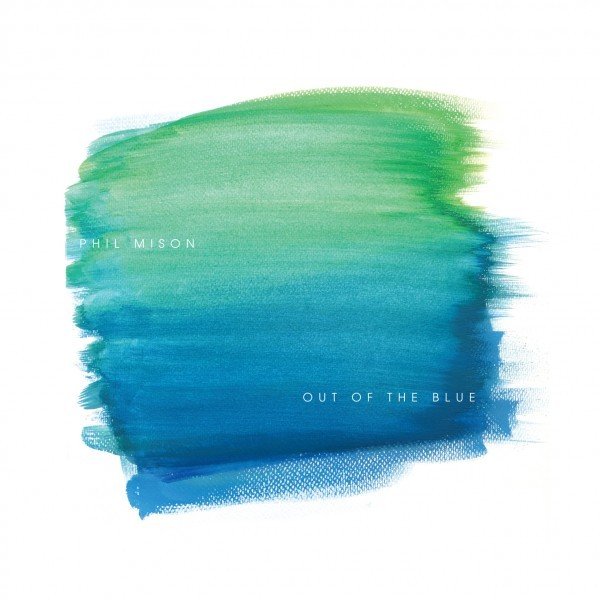Jex Opolis Interview
Record Magazine #3
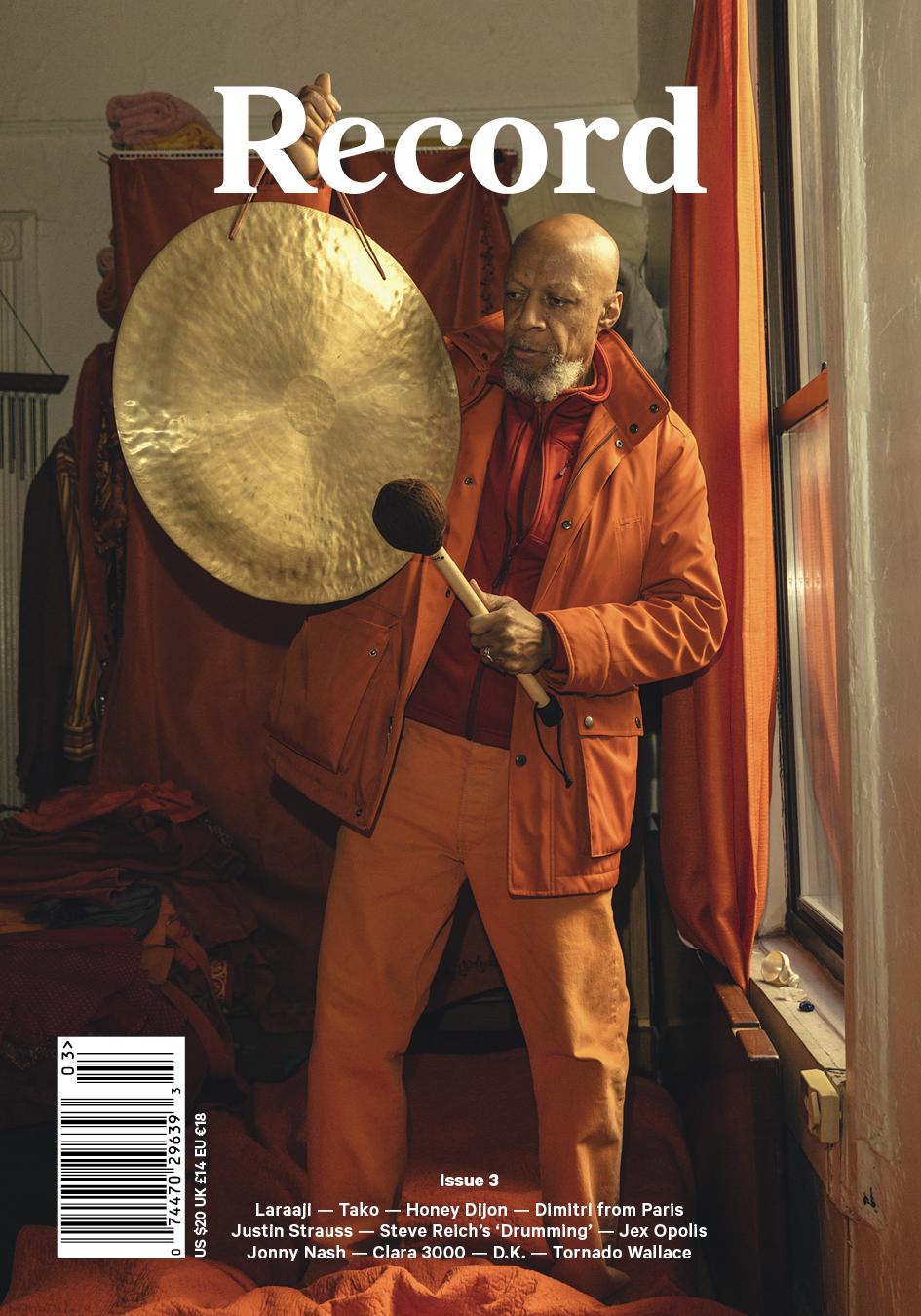
The new copy of Record magazine is out and about and Editor In-Chief Karl Henkell got in touch to see if we wanted to run an interview. We said yes and here are... I'd put Jered Jex Opolis up there as one of my favourite producers working right now and he's got a good head on his shoulders with solid opinions too so we chose his interview to give you a flavour of how good Record magazine is. Over to the chaps.
::
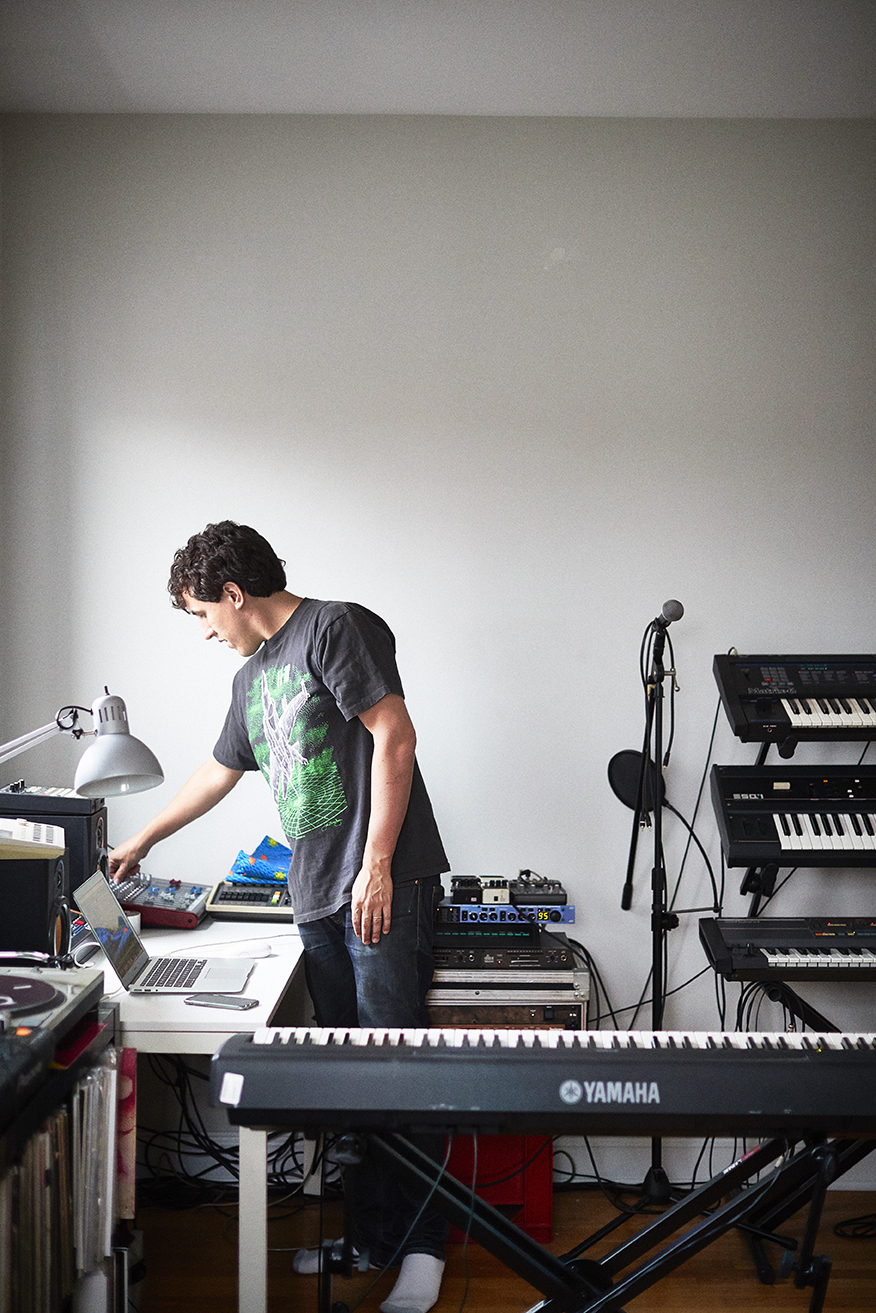
Interview - Karl Henkell
Photography - Paul Barbera
Running his record label Good Timin' has enabled Canadian producer Jex Opolis — otherwise known as Jered Stuffco — to release his own music when and how he wants to; usually with a contemporary disco slant, a strong melody, and a thumping bass line. His '80s influences are undeniable, something he openly embraces as an almost inescapable quality for someone of his generation. His studio setup — comprised of classic '80s synthesizers and drum machines — hasn't changed for years. For Jex, adding new equipment is unnecessary when each machine has its own astounding depth, the intricacies of which can only really be discovered with continued use.
Wary of the rut high profile DJs can fall into — continuously playing the same style of music — Jex prefers the freedom of playing a broader selection of music to like-minded people at small parties around the world.
When someone orders Good Timin' merchandise, if they live close by in New York, Jex will often hand deliver the package and make the personal connection if he can; a customer is a potential attendee of his next party. Parties can be intimidating if you don't know anyone, so Jex attempts to break down those walls by meeting people face to face. That sense of community and willingness to have fun with his label and while DJ’ing is what makes his presence so refreshing.
You grew up in Alberta near Edmonton?
Yeah. When I was growing up there weren't really any touring DJs. I was into bands and stuff in the '90s, and then I got into Warp Records. In high school, I had friends that were into Future Sound of London. I never went to any events, I would just go to rock shows and stuff. Then I moved to Toronto in 2000 where there was a big underground club scene. I got into going to clubs with these greasy guys in muscle shirts.
How old were you at this point?
22. It wasn't like a youthful rave scene, it was more like a club.
Toronto is sort of part of that Midwest, Chicago, Detroit area. Richie Hawtin is from Windsor, which is just across the river from Detroit. This other guy, John Acquaviva, is from London, Ontario.
I kind of moved to Toronto at the end of the rave scene, there had been a big rave scene there, but I completely missed it. I thought it was really wack. It was like this glorification of the past. Nowadays, people look back at the rave scene and there's a Red Bull article and it's like, “The Oral History of the Kansas City Rave Scene” or whatever. I'm sure it was fine and I'm sure everybody had fun and it was great, but let's not glorify things just because we weren't there. It's easy to mythologize things that we had no part of. I mean, if you went to one of those things, it probably was a bunch of spotty teenagers overdosing.
The thing about living in New York, it's so hard right now I think because like, I'm walking around lower Manhattan and there's a plaque where the Mudd Club used to be, and you can walk by where the Paradise Garage was. You read about 2,800 people being at a club on a Saturday night somewhere, one of many, and it's like, “Well, why do I even live here? This city sucks, it's a waste of time.” So the last two years that I've lived here, it's been like a conscious decision to just try to enjoy it and soak in what it has to offer rather than living in the past. You can go to the Loft and it's mostly old records. It's like, "Oh, I'm at the Loft." It's this important historical thing but it's sort of, it's a bit too reverential so it kinda does my head in. I can't really enjoy living here and have that desire to want to party in the past. It's tough.
You prefer to party in the present.
Yeah, and it's a party. You're supposed to go and get off your fucking head, get really fucked up, not think about it too much. There shouldn't be a concept behind partying and stuff except just having fun.
Just having fun is hard these days. With music, it's so hard to even hear stuff in the States that's not controlled by Clear Channel or whatever. I've noticed that with my own label, so I'm ranting and raving here.
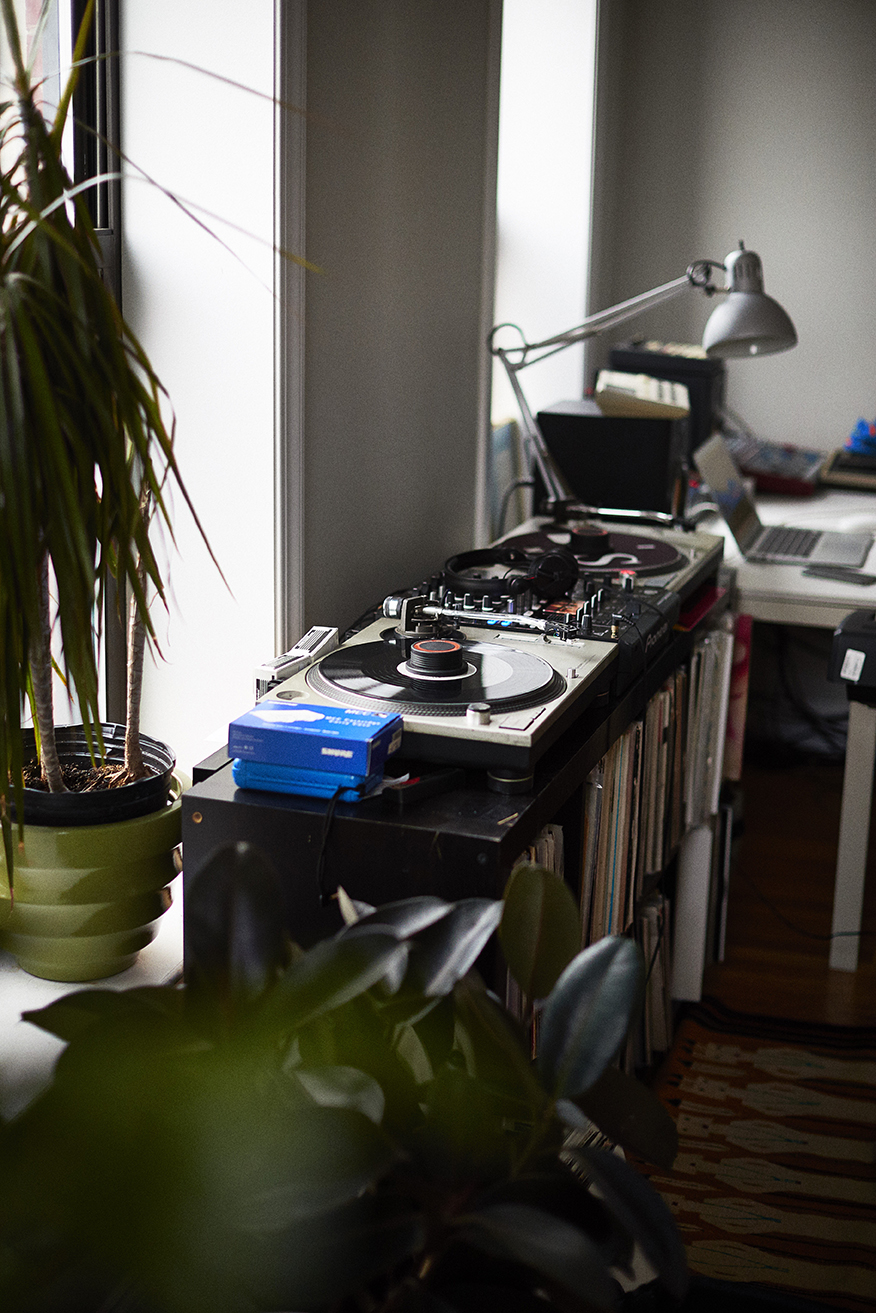
What's that?
Clear Channel? They own all the radio stations. They control the radio waves. I've noticed this with my label — somewhere like Australia, there's strong community radio, and places in Europe have a strong record store culture. Those people, they've been buying my records for three, four years. They were, especially Australia, earlier to catch on, and now in the U.S. there's a few people buying it. In the States it's really hard to be a non-conforming underground artist.
I have a friend who is a couple of years older than me from Canada. I came to visit him like five years ago and we were hanging out somewhere, and I go, "I'm glad I got to see the real New York." And he's like, "No man. The real New York is Wall Street. The real New York is Upper West Side. The real New York is the rich." Those are the people who control it. They've controlled it since the beginning. There was a brief period from the '60s to the '80s, where there was an artists’ stronghold in downtown but if you go to the Wall Street Museum, you see that they set up trading and commerce and everything before there was disco.
The beauty of New York is that mixture of rich and poor, creative and business. I guess I worry that we've lost that. I'm sitting here with you now, you're from Australia, I'm from Canada, and I meet so many people here. There's a lot of people doing interesting things. I feel like lately, there's people that I never thought I'd collaborate with or even meet or hang out with. I'm meeting them from the techno scene or from the rock community or whatever. I feel like it's still a place where you're gonna meet people.
In terms of dissemination of music, it's hard to imagine a situation — like in the peak of the disco era — where Ray Caviano hands Larry Levan records that he plays and the next morning, it's on the radio.
Yeah, everything's so fragmented now. It's good and bad because somebody like me can release records and have a label and reach an audience somewhere. I don't know how many people. I usually press between 500 and 800 copies and they sell. I can go on tour sometimes. I think it would be hard to do that before because it's such a top-down thing. But on the other hand, to really break into that next echelon of success — if you want to call it that — I think you really need to compromise your control. Maybe not the music, but you need to partner with a label or so.
It feels like getting mentioned in really big media doesn't even push the needle anymore.
I think the only thing that you can do is just have word of mouth. Like in movies, still to this day, the greatest driver of profit is word of mouth because they do these huge campaigns. They make so much money on the first weekend and so many just die after that. Movies that really do well are the ones where someone tells a friend.
So I think if you're offering something that's cool and unique then people are going to hear it. If it's not, if it's bullshit, then you can fake it for a bit, but that's why it has to be organic growth and you can see if people like your shit. If they do that's great. Either way it just kind of putts along. That's my whole vibe with the label. I'm just gonna keep releasing music. I'm not gonna get caught up with trying to get on Boiler Room or whatever. I'm just gonna put out my stuff. Some people like it, I can't really force people to listen to my music. Enjoy it or don't.
I imagine it’s liberating, not having to care about a record being a success.
It is. I had a project before this that was on a label in Canada that was tied to EMI, it was a major label environment. I got caught up in, “Oh, so-and-so got on this blog, or this guy's playing 10 shows at SXSW and we're only doing four, like fuck,” you know?
Some of the younger DJs that I know are dying to get agents, dying to get to Europe and dying to play and it's like, “Just take it easy. Everyone fucking relax. Just get good at what you do.” It's almost a blessing if you're doing something and no one's paying attention to you because then you can get better at it. You're not thrust into doing the Ray Ban Boiler Room session or whatever and you can't really mix.
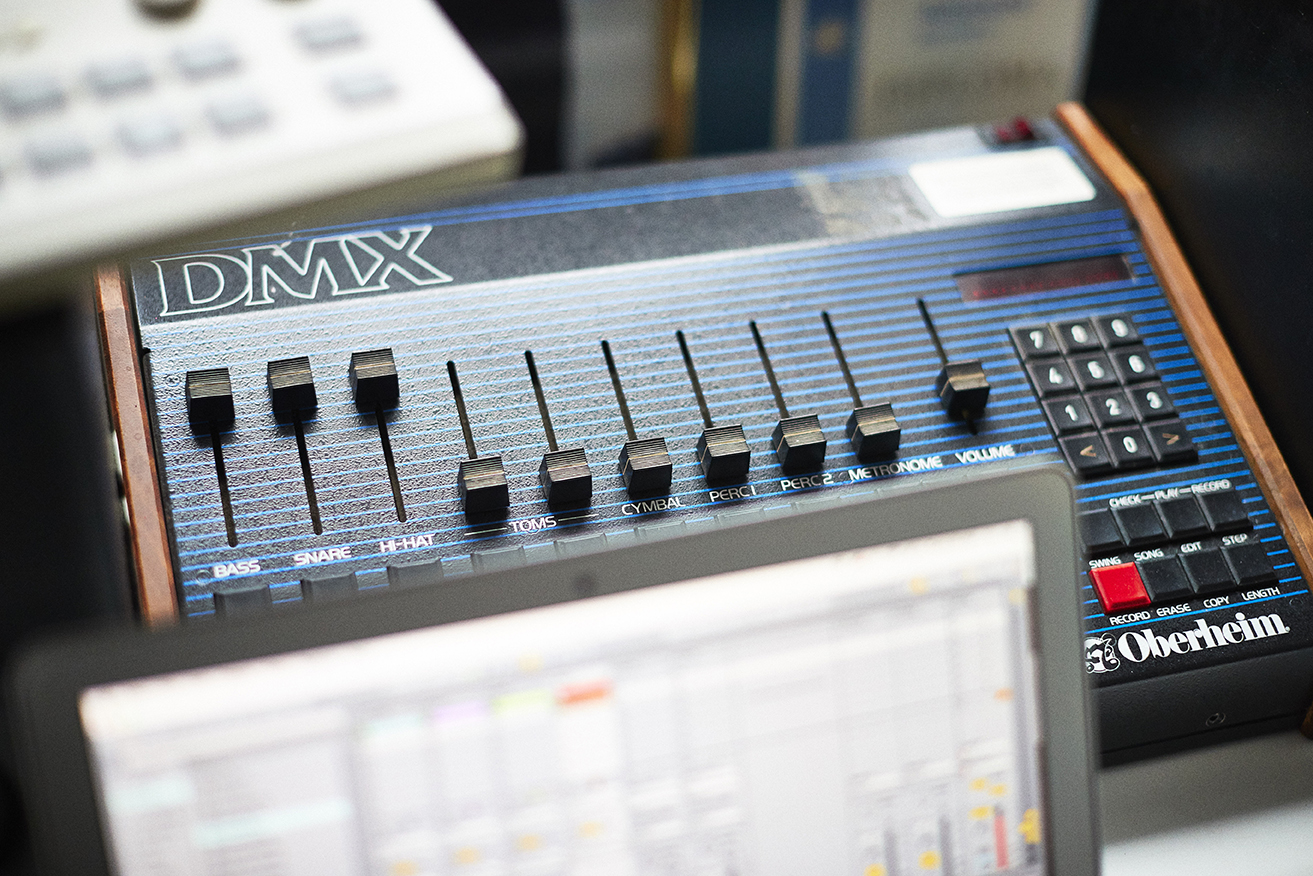
Would you bring other people into Good Timin'?
I've released my friend Roberto, I did his thing, released his record. We collaborate as Conga Radio. He lives in Toronto so we're trying to work on some new material. I was up there in October, but it's sorta hard. I don't want it to be like, I work on something here and send it to him. It's better to get in the same room.
But I don't know. It's tough. I sometimes feel labels today, they just kinda put out whoever. It's like we have an artist from Japan, and here's a guy from Poland, and then there's this chick from Bushwick doing a thing. It's like, “Well what is your label, really?” What’s the theme here other than just your Facebook friend group? I don't know if that's strong enough.
The labels that I think are doing a good job, they represent a scene. Especially if it's a local community, it has more of a flavor or something. I mean, there's like some of the bigger dance labels that do a good job, like Running Back. Every release is like a club track, so if you're a working club DJ, you can go and buy it. I don't know. I thought about releasing other people, but I would have to know them.
It would also take time away from your other stuff.
Yeah, I don't have a budget, I don't have a [pressing and distribution] deal, So every record, it costs me $2,500 or whatever to make, so I'm out $2,500 for six months. People have asked me, “Why don't you release more stuff?” And I'm like, “I'm trying.” I just don't have any money.
Records are an artifact now, and it's almost a luxury item. At the store yesterday, all the 12 inches were 15, 16 bucks.
It feels like a luxury. It's not like a dollar bin record.
No, it's a real investment.
There's something about the never-ending nature of the internet, that doesn't allow people to feel the satisfaction of enjoying one thing though to completion, like a book or an album.
I get asked at least once a day by somebody to do a mix. It's insane. Tim Sweeney's been doing his radio show for 17 years. Let Tim handle the guest DJs and the mixes. Do something else. Find some way to innovate the game, do something new or cool. Don't just ask strangers to do mixes for you. If you're gonna do it, create your community and have it offer something new.
Right, a local experience.
I feel like we're all just racing to do the same thing. We're all racing to do re-edits and we're all racing to find the cool track and do a cool mix. I ask myself too, “Why do I even want to do this?” I love music and my mum made me take piano, so it was beaten into me to express myself in that way. I'm a lifer, I can't do anything else. I sometimes wonder with some of the reissue, re-edit kind of stuff where it's like a middle man. I'm dissing them right now I guess. But why are you really doing this? Is it to share music, is it to make available something you think is amazing or is it to make yourself look cool? I don't know. I think that if you're gonna do it, then you better be good at what you do and you better do it well. There's not a lot of room for half-assness these days.
What about internet radio stations? How do you feel about them?
Just getting up on my soapbox now. I think they're cool. I think they should just serve their local communities. The Lot Radio does that, where it's like everyone is local, they all come in, they're all on camera. Everyone knows each other, you can get a coffee there. It's a community. NTS and Red Light radio, they got a free ride in North America for a long time because there was no one there.
There was no one else.
But now it's good that people are doing that here. We should have our own thing. The European DJs are doing fine. The European labels are doing very well and we need more here. We need more places to go and we need more people involved in North America. I get asked to do mixes for different internet radio shows in Europe, and I'm like, what's the point?
Unless you're there.
If I'm there, sure. We can have a beer and hang out and whatever. Just to have someone literally phone in a mix to play, it's like part of the content game. It's like we need more content, we're gonna up our brand by getting this guy to do a mix because he's gonna share it to his Facebook friends.
Yeah.
What's the goal here?
It just depends what's behind it. Maybe it's someone that's genuinely into it, like in the case of Sanpo Disco, where you contributed a mix.
He's a good example, where he's put enough into it. You can just tell that it's a real series. The art's all cool, and it's all aligned. He had asked me a long time ago and I just can't do them all. Then over like a year or two I noticed that he had put together a really good group of people and they all made sense. All the mixes were really good. I was listening to them and I'm like, “Hey man, you want a mix?” He's like, "Sure." That was really cool. You can tell that it's a passion thing when it comes from that place where it's just executed well.
Or if it's just slapped onto a website.
Yeah, and you feel that with anything. You can just see that even in the way people email each other. You can't just go on Facebook and be like, "Hey." You don't know this person, it's just like, "Can you do a remix for my label?" We're human beings here. Send an email, "Hey, I'm Jex, I've got a label called Good Timin', we've have like nine EPs out, really been a big fan of your work for a while. We want you to do a remix for something." That's what I'll say if I'm gonna approach somebody or if I'm gonna try to get somebody to do something, you know. Maybe I'm old school that way though.
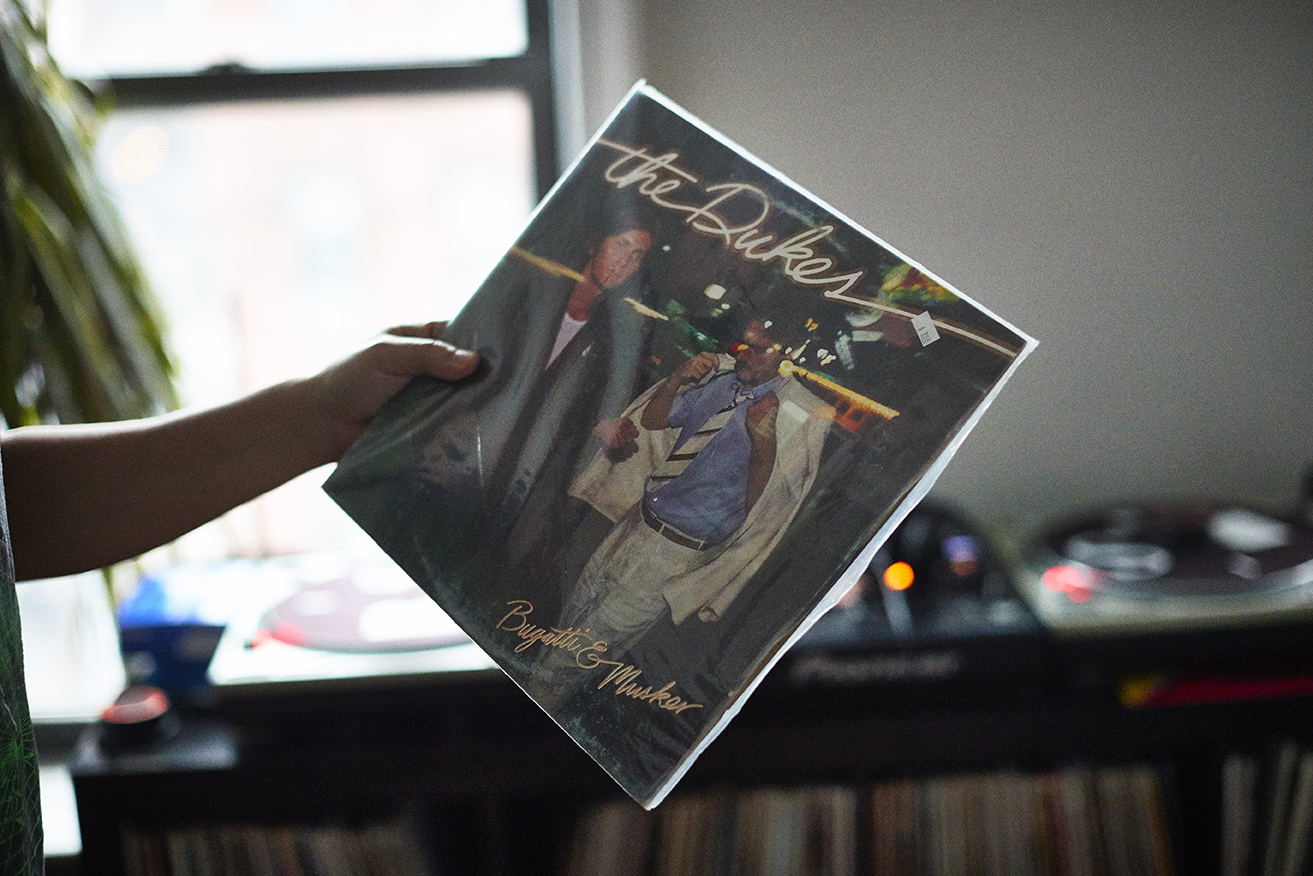
You grew up in a small town. I was thinking about there being something nice about the village disco, like the idea of one place in the town that everyone goes to.
Yeah, growing up there was this club called Lush. It was big, it held 800 people. There'd be a group of Britpop people there, I'd be hanging out with them. The DJ would be playing house and then he would play Depeche Mode, New Order, Pulp’s “Common People,” Blur’s “Boys and Girls,” then you might get some Oasis songs, then he would play Rage Against the Machine, and then he would go back to like a couple of house tracks. It was kind of pleasing everybody. Nowadays, you go to hear a DJ and it's often like only techno, only disco, only Balearic. I find it hard to stick to just one style. A lot of really good DJs are just like, “Here it is. This is what you want, I know what's best. Take this, enjoy it.”
Do you feel connected to the music scene in Edmonton?
In Edmonton, there's this huge burst of creativity. I think my generation were sort of the first wave of that. So many people that I've played shows with in Edmonton are so talented but they couldn't do it like they could now. They couldn't harness the power of the internet to broadcast their ideas. I have a friend who's like the best guitar player in the world, I could swear he's like Graham Coxon meets Johnny Marr meets Kevin Shields. His peak as a musician didn't come with any internet stuff and Edmonton is so isolated that I think that these younger people, they hit it right where there was enough of them. They all moved, too. They all moved to Montreal, Vancouver or whatever, so they were really able to capitalize, use their talent and be heard, whereas people just a little bit older really missed out.
The technology wasn't there yet.
Yeah, the internet didn't happen. There was no Bandcamp in 1998. I've just been doing it long enough that I'm able to have a website and do all that stuff. I feel like the people I grew up with were sort of the precursor to that. There's enough talent in a place like Edmonton. It's a comfortable and relatively affluent place. There's a good education system, people have spare time and they're not worrying about where their next meal's coming from so you can really work on it. Also, you can just play in people's basements because the houses are huge. They're separated so you can just jam in your parents' basement. I think that helps too, whereas here, like in New York, you can't. I think you have to have that first, before you move to a place like this, because if you don't then it's so hard to find rehearsal space.
What made you go down the path of journalism and writing?
I moved to Toronto and I basically quit my band and just got into going to nightclubs. I basically sold gear to buy ecstasy and I was realizing that I was on the wrong path so I moved back to Edmonton to finish school. Then I got involved with the student paper and at the time I really enjoyed it. I liked it, then I moved back to Toronto and got into the journalism school and was really focused on doing that for about 10 years. I worked in Egypt for six months.
How did that come about?
It was through a Canadian workplace thing. They would place you at a newspaper in the Middle East then supplement your salary. It was amazing.
Then I worked in Toronto for seven years in TV and everything. But I always loved doing music. The media, it's such a hard place to make a living I think. I got a job, it was for a medical journal but it was like for business to business, so it wasn't like hardcore journalism. I found myself just sort of getting out of that. Then when we moved here, it was like, OK, I'm not going to be wearing a cheap tie in Times Square, handing out my resumé at Bloomberg Businessweek or whatever.
Is that what it looked like in Canada? An office cubicle, lots of coffee, business shirts.
Yeah, sort of, it did. Like the shittiest business suit you've ever seen in your life. Like it's too small and too big at the same time, that was me for a while. I found that I had a good run and I found that my work was getting sloppy. If you're an airline pilot and you notice that you're getting sloppy, you should probably quit before somebody gets hurt.
It's ironic that I quit music to do journalism. I probably should have stayed in Toronto, maybe done less drugs and then focused on making music more. I was already making beats and stuff but I just didn't have the confidence to step out. And I had pressure to finish school because my family is fairly academic.
With the younger people that I meet who are 22, 23-year-old DJs, and they're really good and their production's good, I've joked that, "When you're in your late 30s, you'll be doing ska or something."
It's hard to stay focused on one thing. Richie Hawtin has been doing techno for 25 years. I remember, I went to hear him in Detroit a little while ago and I'm like, "Man, doesn't he ever just want to drop a fucking country and western track in the set or something?" How does he just do one tempo, one style for six hours every night for 30 fucking years. I'm like, "Don't you just have the urge to drop a Talk Talk track in your set just once or something?" But he never does. I admire that. I wish I could do that.
Do you find it beneficial to have a side job?
For sure. Remixing feels like work. I feel like I only have so many ideas in me. I think at my age, I'm getting to the point now where I'm running out of ideas, so if I do a remix it's like cutting a little piece of my skin off or chopping a finger off. It's like, "Oh I hate to do this but here's my pinky, now you can send me my remix fee." Also, you should be in the studio working on new music and working on your own stuff and if you get in that remix cycle, I would imagine it's like what being an adult film star is like. You spend all day in bed and when you get home, your spouse is like, “How’s it going?” And you're like, “Not tonight.” So when you finish your remix, you come home, open up your laptop and you're like, "I'm gonna do this sick track." It's like, I just want to have a beer.
I have a theory that I don't trust anybody that doesn't have a day job in music. If someone has a day job then you know, they're forced to be responsible. You know you're gonna get paid if you show up to a gig and the people have a nice home and they have a day job or whatever. If they're artists, if I booked myself, it'd be like, “Ugh this guy's gonna screw me.” I'm joking. But it's like, you know the part of “The Departed” where he goes, "Yeah, man, you should get married, you should really get married," and Leonardo DiCaprio's character is like, "Why's that?" And he says something like, "Well, because then men know that you're trustworthy and women know that your dick works." If you have a day job and you're making music, it's like you're doing music for the passion. You're not just rinsing a genre.
Right, because it puts you in a different position if you're forced to make money through music entirely.
You have to release more music or there's a compromise there somewhere. I mean, it's not always the case, there's people that can do it. For me personally, I'm glad that I have income from elsewhere.
What does success in the music industry look like for you?
I think I'm really lucky that I can release music and it's not like a thing where it becomes about money or anything. It's just nice to have people listen to the records and it's nice to DJ. I get to travel sometimes. I've talked to more famous DJs and a lot of times, I don't think they have very much fun. When you get an agent and they're booking you for money and stuff, I think you're doing gigs that just aren't that great. Whereas I get to stay at somebody's house and get to know them, and the parties are small.
You're gonna make new friends kind of thing.
Yeah, and they're like-minded people and it's great. I think for me, one thing I'd like to do is play more in North America. If I could play in American cities more, that would be amazing.
A guy from a record shop in Dallas, Texas bought six records wholesale off me and I thought, “Wow, that's amazing.” That's success to me.
So you could go out and play there now.
Six people will potentially come. That kind of thing is amazing. I'm just trying to be happy and not get sucked into that trap where you're looking at other people who are getting more gigs.
That's easy to do with the internet.
And I live in New York, I never thought I'd live here. The first record I did, I got married and on my honeymoon I went to hear Harvey play in San Francisco. So we were in San Fran, it was actually the opening DJ, this guy Eug from San Francisco, his opening set was amazing. When I got home from that I was like, I want to put out a record, something that guy could have played in his warm-up set.
So I did my first Good Timin' record. I had all these warm vibes from getting married and everything was good. I wrote this track and I financed it with my tax return, which was $1,500. Then every release since then has paid for itself. Then I start the cycle over, so that's sort of the model, for lack of a better word. Just to keep it going as long as it can go, and then if one record completely flops I lose two grand.
Then I'll just go back to doing my content. It's a blessing to be able to do it.
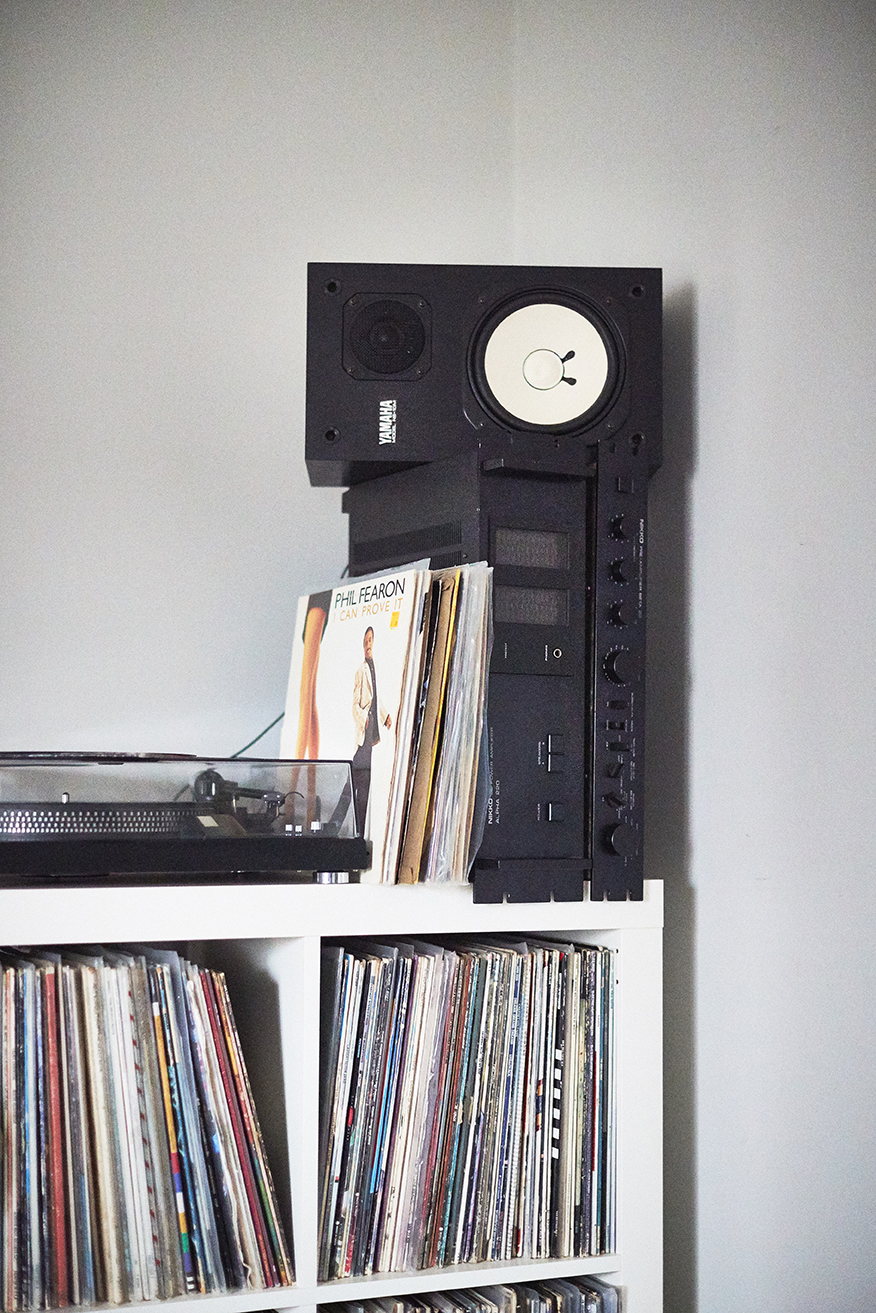
Are you inspired by producers from the '70s and '80s?
I'm sort of trapped in the '80s. I really am. My generation, when I was born, what music I like even today, I love the '80s. I love Hall and Oates. I love everything about it. It was like a combination of technology and Joe Jackson’s “Steppin' Out.”
Do you work with newer equipment?
Not really. A lot of the gear I have is from the '80s too. I have a DMX drum machine in there, the KR55, both '80s, a Juno 106 I've used more than any other synth. The DX-7, '80s. Even the effects I use are generally outboard '80s-style choruses and reverbs, so it's like I'm trying to do more modern-sounding stuff now.
The new record doesn't sound nostalgic.
The LP doesn't. That was a really concerted effort to try to do something contemporary. I put live drums on it and the drums were tracked in a really modern style. I wanted the LP to be a break from the rest of the label, so the other ones are like Balearic slower tempos and stuff. I wanted it to be something that a Pitchfork reader could get into.
There's drums on it, and the texture of it, trying to make it modern. I also have some club stuff coming up this year that's going to be more modern sounding. Inevitably it'll just sound like the '80s. You are what you are and accepting that is part of life.
How long did it take you to produce this album?
It took about nine months. I had nine tracks, it was gonna be for a label but then, the label deal wasn't great so I decided to put it out myself. A friend of mine was like, "I have some studio time." I did a barter thing where I did some work for him. Then I got into this amazing studio, Oscilloscope. I got into there and that's when I put all the live drums over it.
I used to be a much better drummer so I was kind of cocky, "Yeah, I can go in and do drums." The drums were not good and I had to spend a lot of time editing that. Also, mixing live drums versus mixing samples or a drum machine is way different so I had to relearn all of that. It took a month just to get the drums sounding how I wanted to. It's like 11 tracks of audio for one drum kit. You get the overhead sounding good and the kick disappears. You get the snare sounding good and the overhead disappears. So I spent a lot of time on these NS10s [speakers] just listening to the drums and listening to a '70s rock record or listening to Steely Dan records and being like, “OK, the drums sound like this, how can I try to make the snare pop,” or whatever. It just took weeks to do that. I ended up having to change my workflow because it's so hot in this apartment in the summer. I was going to Whole Foods on Houston and just using headphones.
You wrote that in the liner notes, didn't you?
They have a workspace up top and they have bad Wi-Fi there too, which is great 'cause I wasn't surfing the internet. I'm just focused on doing it. I'm editing all the drums, making sure everything was in line.
Is that different to your other releases?
Yeah, there's sort of a backlog of stuff. I have all these tracks that I haven't released. I find that people release too much stuff sometimes and I'm doing everything myself. I just wanted it to come out in a nice, orderly fashion so I'll stop making music for a while. I was going to the gym and stuff. I stopped going to the gym, and now I'm making music again.
Can you do both?
Maybe you can. If you make tech house, you have to make music and go to the gym. You have to be kind of jacked to do it. I mean, I'm getting back into doing some new tunes now.
I find it interesting how whenever music is released, that's the context it sits in, even if it might have been produced years ago.
But it's funny, I feel like if you hold onto stuff for too long, it gets stale in your mind. I think it even gets stale in the public consciousness too. I mean, you can't shut yourself off from contemporary culture, what the community's doing. I'm really dying to get this album out because there's been a bunch of artist albums come out by people in my scene, so I feel like there might be some fatigue. I'll press a few hundred and that's it. It kind of goes back to the way I do things, just get it out, make it as good as you can and as cool as you can then move on to your next project, rather than trying to make it the biggest fucking album of all times. It's not gonna be “The Wall.”
Can there be another “The Wall”?
I don't know. People can rinse their audience 'cause we're just on Facebook posting to the same people anyway. I can post a million articles from Vice and Spin or whoever. And they already know. They're like, “OK, I get it. You're doing an album, congrats, man.” It's like, "Stop fucking telling me that your stupid album's coming out. I know, I saw the 5 million Facebook posts. I saw your 20 Instagram videos." So you're kind of just stuck with who you are anyways.
Record is available to order in full at http://record-magazine.com.

